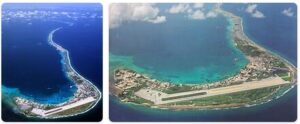Situated in the central Pacific Ocean, the Republic of the Marshall Islands (RMI) is a sprawling archipelago comprising 29 coral atolls and five isolated islands. With a population of around 58,000, the capital, Majuro, serves as the administrative and economic center. The Marshall Islands gained independence from the United States in 1986, following a period of strategic trusteeship. As a Compact of Free Association partner with the U. S. , the Marshall Islands maintains close ties, receiving financial assistance and defense provisions. The nation is known for its rich maritime heritage, traditional seafaring skills, and unique Marshallese culture. The government operates within a presidential republic framework, and both Marshallese and English are official languages. The Marshall Islands faces complex challenges, including rising sea levels due to climate change, nuclear legacy issues from past U. S. nuclear tests, and economic vulnerabilities associated with its small size and limited resources. In terms of foreign policy, the Marshall Islands’ geopolitical situation is deeply influenced by its association with the United States. The Compact of Free Association grants the U. S. military strategic access to the region, and in return, the Marshall Islands receives financial assistance for development and capacity-building programs. The country actively engages in international diplomatic efforts, particularly on issues of climate change and ocean governance, reflecting its vulnerability to rising sea levels and the broader impact of climate change on low-lying island nations. The Marshall Islands has been a vocal advocate in global forums, emphasizing the urgent need for climate action and adaptation measures. In addition to its emphasis on climate change, the nation participates in regional organizations such as the Pacific Islands Forum (PIF), addressing shared concerns related to security, economic development, and cultural preservation. The Marshall Islands’ diplomatic engagements often reflect the dual challenge of balancing environmental concerns with economic sustainability. Economically, the Marshall Islands faces constraints due to its small market size, limited natural resources, and remoteness. The government has sought to diversify the economy, focusing on sectors such as fisheries, tourism, and the offshore financial industry. However, challenges related to infrastructure development, education, and healthcare persist, and the nation remains dependent on external assistance. The Marshall Islands’ unique history also involves grappling with the legacies of nuclear testing conducted by the U. S. in the mid-20th century. The impacts of nuclear contamination persist, posing environmental and health challenges. The country advocates for nuclear disarmament and actively engages in international efforts to address the consequences of nuclear testing. In conclusion, the Marshall Islands, despite its small size and vulnerabilities, actively shapes its foreign policy to address pressing global issues such as climate change and nuclear disarmament. The nation’s strategic relationship with the United States, combined with its diplomatic endeavors on the international stage, underscores its commitment to navigating the complex challenges that define its unique position in the Pacific region. THEMOTORCYCLERS: Features defense and foreign policy of Marshall Islands.
Marshall Islands Travel Information

The Covid-19 pandemic has so far led to a delay in entry for all foreign travelers, and planned trips to the Marshall Islands must therefore be postponed or canceled. For more information, see the entry entry. Safety Norwegian citizens staying…
Read more